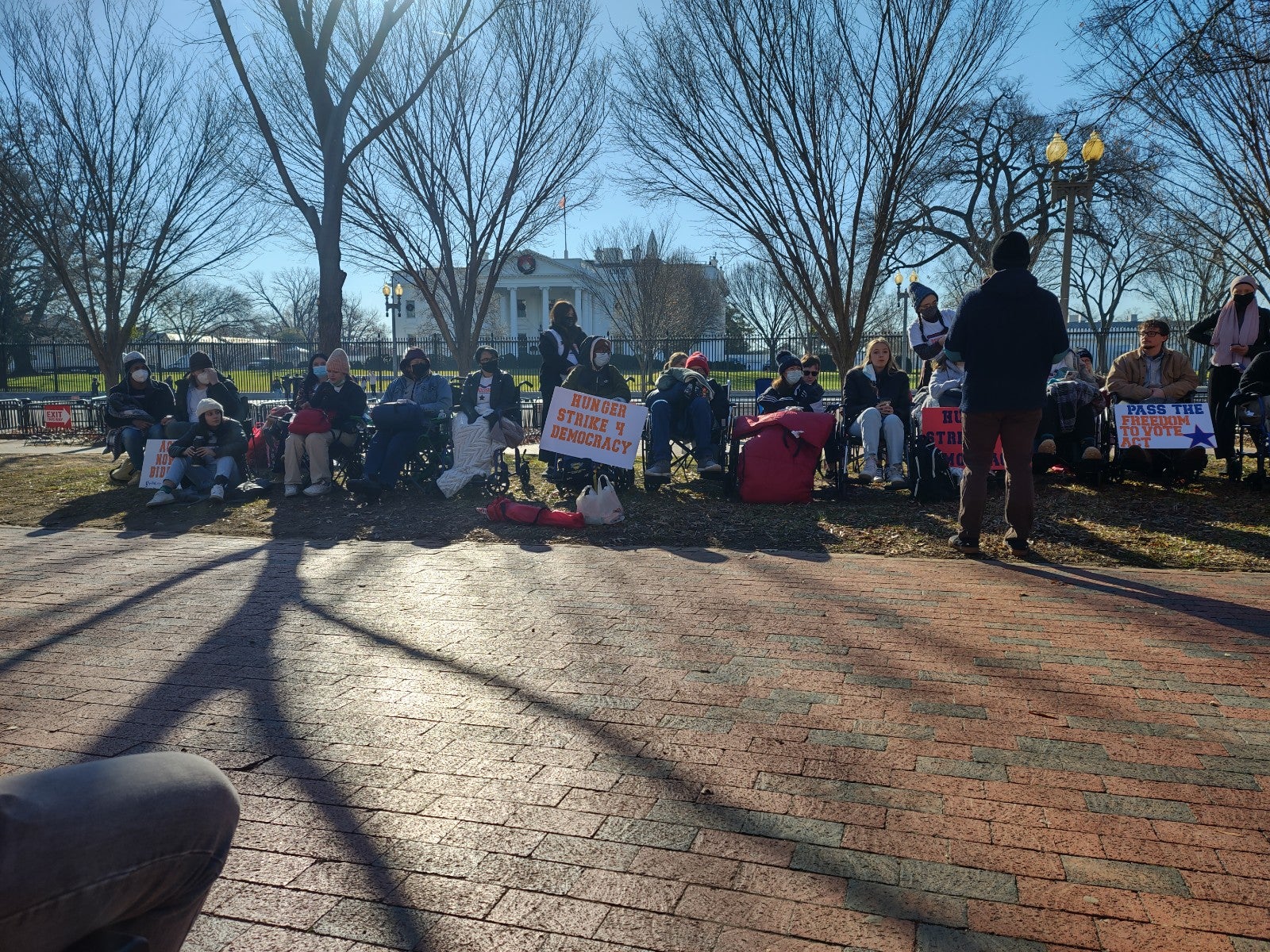Harvard’s Larry Lessig joins student hunger strike calling for action on voting rights
White House rally follows meeting with Kyrsten Sinema over filibuster carve-out

Your support helps us to tell the story
From reproductive rights to climate change to Big Tech, The Independent is on the ground when the story is developing. Whether it's investigating the financials of Elon Musk's pro-Trump PAC or producing our latest documentary, 'The A Word', which shines a light on the American women fighting for reproductive rights, we know how important it is to parse out the facts from the messaging.
At such a critical moment in US history, we need reporters on the ground. Your donation allows us to keep sending journalists to speak to both sides of the story.
The Independent is trusted by Americans across the entire political spectrum. And unlike many other quality news outlets, we choose not to lock Americans out of our reporting and analysis with paywalls. We believe quality journalism should be available to everyone, paid for by those who can afford it.
Your support makes all the difference.Harvard University professor and longtime elections reform activist Larry Lessig joined a group of college students from Arizona on a hunger strike outside the White House on Monday as the group seeks to pressure Democrats to act on voting rights legislation.
The strike, which has entered its eighth day, now includes about 18 participants including Mr Lessig after a handful ended their personal efforts due to medical issues.
Activists and a few supporters rallied in Lafayette Square on Monday and spoke about the urgent need to pass reforms aimed at protecting access to the vote, stopping gerrymandering, and reforming dark money rules. Several, including Prof Lessig, warned that the next few months were pivotal as Democrats face an unfavourable midterm map exacerbated by recently redrawn districts in some states that are expected to cement GOP control in some areas and give the party an edge for control over several swing district seats.
“The threat is that this election [in 2022] will cement the United States as a minoritarian democracy,” Prof Lessig told The Independent in an interview.
“What this means is that a minority of America now has the power to block a majority,” he continued, adding: “We’ve evolved a democracy where just over one fifth has a veto over anything that we could do.”
They were also joined on Monday by Joe Madison, a SiriusXM radio host and human rights activist who launched his own separate hunger strike several weeks ago, declaring that he would not eat solid food until “Congress passes, and President Biden signs, the Freedom to Vote Act or the John Lewis Voting Rights Advancement Act”.
Mr Madison recalled his time with the NAACP working to register Black voters across the northeastern US when President Joe Biden, then a member of Congress, appeared at a campaign stop to help.
“If Joe Biden can show up when we were registering people to vote, he can damn well show up to protect that vote,” Mr Madison said to a roaring cheer from the activists.
“This is not a public policy issue. This is a nonpartisan issue,” he said.
Students participating in the strike came from Arizona State University, University of Arizona and other schools in the state. The group’s original demand was for a meeting with Sen Kyrsten Sinema, Arizona’s centrist holdout against changes to the Senate filibuster rule that would make passing voting rights legislation possible in the evenly divided chamber.
The students met with Ms Sinema over the weekend, and urged her to support a carve-out in the filibuster rule that would allow legislation such as the Freedom to Vote Act to pass without the threat of a filibuster, which essentially forces any legislation to obtain a 60-vote majority to pass. Ms Sinema reiterated in a statement to The Independent that she does not support any changes to the filibuster, but supports the voting and election integrity protections themselves.
“I appreciate all Arizonans engaging in our public discourse and policy and encourage young Arizonans to stay engaged in ways that protect their health and safety,” said the senator.
On Monday, Prof Lessig told The Independent that he was optimistic that Democrats could find the support needed to move Ms Sinema and Sen Joe Manchin of West Virginia, another centrist holdout, on their positions regarding the filibuster, citing his own conversations with people in the Senate.
“I’m talking to a lot of people in the Senate. I see signs for optimism,” he said. “I mean, nothing is announced, no deals have been made, blah blah blah … but I think that we’re gonna see progress.” He confirmed in a follow-up question that he was referring to progress occurring in the next month.
“I think the next month is make or break,” Prof Lessig added, insisting that the legislation needed to go into law before the 2022 elections radically changed the shape of Congress. “If we don’t pass the Freedom to Vote Act, then it’s broken.”
The Independent reached out to the White House early Monday morning regarding whether any officials would be meeting with the student activists or Prof Lessig, but had not received a response at time of publication.
Join our commenting forum
Join thought-provoking conversations, follow other Independent readers and see their replies
Comments